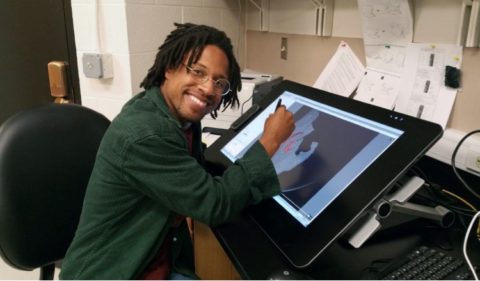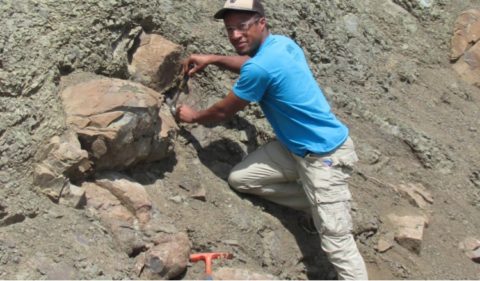
Brian Atkinson in the lab
Editor’s Note: The Happy Beginnings series features recent College of Arts & Sciences graduates who are getting started in careers, graduate school and service.
By MC Tilton, PACE Writer
Ohio University alum Brian Atkinson ’12 has been busy making his mark in the ecology field.
Atkinson earned a B.S. in Environmental Plant Biology in 2012 from the College of Arts & Sciences at Ohio University.
He received his Ph.D. in Botany and Plant Pathology from Oregon State University this year and is now a post-doctoral fellow in the Ecology & Evolutionary Biology Department and Biodiversity Institute at the University of Kansas.
He has been published nearly 10 times in journals such as Botany and International Journal of Plant Sciences and has presented at more than 15 conferences with 15 grants.
What is your favorite part of your job and studies? The most rewarding thing in your job and studies? The thing you’re most proud of in your job, studies or career?
“I just started here, but so far, the greatest aspect of my work is discovering ancient plants from the distant past that no one has ever seen before and also exploring how that changes our understanding of how plants evolve through time. One of the nice parts of my new job is I get to go to Antarctica in November where very few people have been – there’s this really exciting aspect of exploration in my work which is really rewarding.”
How did your experience as a PBIO major prepare you and shape your career path?
“Before I got to OHIO, I didn’t know very much about plants, and the PBIO department has such an awesome organismal focus that introduced how alien plants are from humans and other animals. That really inspired awe for me. I found it really fascinating, and it really pushed me to explore the diversity of plants. It also gave me a different viewpoint on life on earth; we always look at the anthropogenic viewpoint, and there are plants living completely different than other things do, and that really excited me.”
What’s your favorite memory of the department?
“My favorite class was Diversity of Life, taught by Dr. Philip Cantino at the time. I also loved the labs when you actually got to deal with the different types of plants – it was really hands-on and the encouragement of undergraduate research really helped pave the way into a research-oriented career path.”

Atkinson collecting fossil specimens
What has your career path been like?
“I hope to continue life in academic research and become a research professor and continue exploring plant evolution through the fossil record.”
What was the biggest challenge you had to conquer that helped shape your path?
“There’s not a whole lot of black people in this field and in science overall, and the OHIO department was really good at being inclusive, but I can’t say that for everywhere I’ve been to, which certainly has its challenges. I’ve especially experienced a lot of institutional racism firsthand, but this field is still something I really want to do, and growing up with those challenges gave me really thick skin.”
Why did you want to study plants?
“I started as a fine arts major, but just before classes started, I changed it to plant biology because I discovered I was more interested in environmental science than art for a career. I started to get more into evolutionary studies as I progressed.”
What advice would you give current students?
“Take advantage of different research opportunities, whether they be grants or a huge variety of classes for what you don’t and do like. Finding those opportunities was one of the most important parts of my undergrad.”
What was your most important experience as a PBIO major?
“I’d say the faculty and the great education they provided – they had great classes that are really hard to find anywhere else, believe it or not. I took it for granted at the time, but that is probably one of the best departments in the country.”
How did your undergraduate research prepare you for the real world?
“I learned that academia has to do with discipline, paying attention to detail, focusing, thinking critically, reflection, and following through — all important skills that are really important for life after undergrad.”
What was one mistake in college that you would warn against?
“Don’t wait until the last minute to do things! Time management is really important. Also, I wish I would have gotten into paleobotany earlier, but it still worked out for me. I’d also say that it’s great to focus on your science classes, but consider taking different cultural classes that expand your way of thinking about things. That was one of the best things I did for myself — learning about different religions and cultures — and that gave me a rounded education.”



















Comments